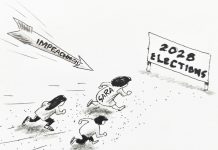If Eastern Visayas officials linked to the massive corruption now being exposed nationwide deny their involvement, why does the independent commission tag this region as the epicenter of it all? The question cannot be dismissed, for it points to a reality that denial alone cannot erase. The stench of corruption has sources, and the hands that hold the funds are the same now, pleading innocence.
The commission’s report is not a baseless accusation. It was borne out of records—documents showing billions of pesos allotted to projects that exist only on paper. Roads that were never built, bridges that lead nowhere, and flood control projects that remain invisible are too many to ignore. These are not anonymous blunders; they are transactions with signatures, approvals, and releases authorized by offices that belong to those now denying their involvement. The evidence speaks louder than their statements of denial.
The corruption trail in Eastern Visayas is not an abstraction. It is evident in the ghost projects scattered across the region, the discrepancy between the government’s reports and the actual condition of communities, and the obvious enrichment of those who occupy public office. When projects worth hundreds of millions are supposedly completed but residents see nothing but barren fields, it becomes impossible to believe that no one among the officials knew. Corruption does not thrive in secrecy alone—it thrives with permission.
For too long, accountability has been reduced to political theater. Investigations are launched with fanfare, yet conclusions are delayed, manipulated, or forgotten once the public’s attention shifts. Meanwhile, the region remains underdeveloped despite years of generous funding from the national government. Who stole the money if no one among the region’s leaders is guilty? The people? The wind? The lie collapses under its own weight.
Every transaction, every contractor, every approving officer must be subjected to a full, transparent audit—public and independent. There should be no sacred cows, untouchable offices, or political shields. The people of Eastern Visayas have endured poverty and calamity long enough; they should not also endure being robbed in their name. The cleansing of this region’s governance must begin where the denials end—with the truth, however painful it may be.




